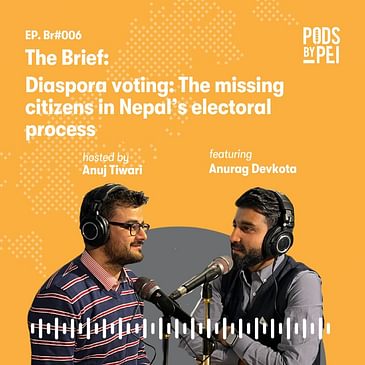Ep. Br#006
In 2018, the Supreme Court of Nepal, in response to public interest litigation filed by a group of human rights lawyers, issued a verdict to grant “external voting rights” to the Nepali diaspora. Today’s episode is a discussion between Anuj Tiwari, Senior Researcher at PEI, and Anurag Devkota, one of the lawyers responsible for that public interest litigation, about the issue of voting rights, or the lack thereof, for the Nepali diaspora. The discussion is based on Anurag’s 2020 op-ed piece, Nepal’s Own Mail-In Voting Crisis, which was published in The Record. The topic, however, is more relevant today as Nepalis get ready to partake in the 2022 general election in a matter of days, but without the Court mandated provision.
The two discuss Anurag’s reasons behind filing the public interest litigation in 2017 and his take on the failure of the Election Commission of Nepal to implement the verdict of the Supreme Court. Anurag argues that the lack of political representation of the Nepali diaspora, especially those who are out for labor migration, is a key reason behind the vulnerability that has resulted in the active exploitation of their human rights. And that it is our responsibility to ensure their right to vote, given that the country relies so much on their contributions. We also discuss some of the systemic and political challenges to implementing external voting, including logistics, cost, and political will, and the practices of several countries in Asia and Africa that are similar to Nepal.
Anurag is a human rights lawyer at the Law and Policy Forum for Social Justice. He holds an LLM degree from Loyola University Chicago. He is the incoming Global Criminal Justice Fellow at the Center for Criminology at Oxford University and the Civil Society and Public Administration Fellow at the Toronto Metropolitan University. He also runs “Rights Lab,” a research institution that works on the issues of rule of law, democracy, human rights, and migration governance.




